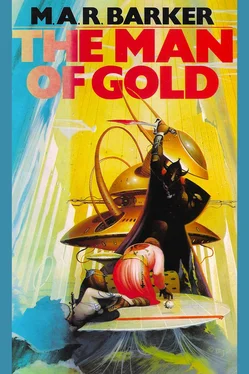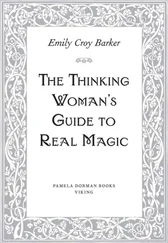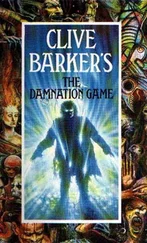M. Barker - The Man of Gold
Здесь есть возможность читать онлайн «M. Barker - The Man of Gold» весь текст электронной книги совершенно бесплатно (целиком полную версию без сокращений). В некоторых случаях можно слушать аудио, скачать через торрент в формате fb2 и присутствует краткое содержание. Жанр: Фэнтези, на английском языке. Описание произведения, (предисловие) а так же отзывы посетителей доступны на портале библиотеки ЛибКат.
- Название:The Man of Gold
- Автор:
- Жанр:
- Год:неизвестен
- ISBN:нет данных
- Рейтинг книги:3 / 5. Голосов: 1
-
Избранное:Добавить в избранное
- Отзывы:
-
Ваша оценка:
- 60
- 1
- 2
- 3
- 4
- 5
The Man of Gold: краткое содержание, описание и аннотация
Предлагаем к чтению аннотацию, описание, краткое содержание или предисловие (зависит от того, что написал сам автор книги «The Man of Gold»). Если вы не нашли необходимую информацию о книге — напишите в комментариях, мы постараемся отыскать её.
The Man of Gold — читать онлайн бесплатно полную книгу (весь текст) целиком
Ниже представлен текст книги, разбитый по страницам. Система сохранения места последней прочитанной страницы, позволяет с удобством читать онлайн бесплатно книгу «The Man of Gold», без необходимости каждый раз заново искать на чём Вы остановились. Поставьте закладку, и сможете в любой момент перейти на страницу, на которой закончили чтение.
Интервал:
Закладка:
Siyuneb never saw Chakkunaz again, nor was she told what had become of him. The heavy coins he had carried for her vanished as well. Yet she herself was treated with all the deference due a First Concubine, and no one touched the jewels she wore. A cold-eyed captain and a trio of ebon-robed hierophants questioned her politely but at length. Hours, days-months? — passed; she had no idea of time within the blind walls of Lord Quame’el’s inner temple. Her interrogators advised her not to return to Lord Ketkorez’ palace, not to meddle, never to seek to learn what had occurred. She should go back to her village in the Tlashte Heights and find her clansmen. Her gems would buy a little house, a patch of garden, and a decent husband; then she must make her peace with Lord Qame’el, devote herself to His worship, and grow old as gracefully and inconspicuously as possible.
That was all. She was free.
One thing she remembered from the dreary, anxious hours of her interrogation. It was just a word, one she did not know: He’esa. Her questioners asked her repeatedly and interminably about that, but she could only shake her head.
What was a He'esal She never dared to ask.
In Jakalla the city watch reported that one Dlamu hiTranukka, a rascal who dealt in gems and other curios, had disappeared. Only his much overworked staff thought to ask what the mess was that someone had thrown down upon the floor of his strongroom. He had no strong clan affiliation, no family, and hence his presence was not much mourned. His wealth, on the other hand, proved most useful: it provided the barristers of the Palace of the Realm with cases, claims, and counter-claims for years to come.
Three scribes who served General Kadarsha hiTlekolumii, of the Tsolyani Imperium’s Legion of the Searing Flame, vanished as well. They were serious, conscientious, unassuming workers, and he briefly mourned their loss. He mentioned the matter to his master, Prince Mirusiya, one of whose adherents he was, but the Prince only remarked that some of his own people had suddenly become ill and died, too, quite unaccountably. General Kadarsha’s physician and sometime house-wizard, Eyloa, consulted his tomes and suggested the possibility of a new form of the terrible Ailment of Arkhuan Mssa. For several days thereafter Eyloa appeared more than usually grim and morose, which was odd even for an eccentric philosopher such as he.
Several servitors of the Vriddi clan of Fasiltum perished mysteriously, as did a half dozen subalterns and junior officers of the Legion of Victorious in Vimuhla, one of Mu’ugalavya’s elite units. An Ahoggya village chief in Salarvya, a Shen egg-layer in Mmatugual, a handful of Pygmy Folk in the subterranean den-city situated on the eastern border of Yan Kor-all did the same. In Yan Kor itself, the clever young master of the Clan of the High Spires of Riilla was found to be missing, and the matriarchs of the clan hastened to marry his plump widow to his younger cousin, a simpleton far more amenable to decent female management than he had been!
The Lord Staffbearer of the Palace of Effulgent Radiance in Saa Allaqi discovered raddled garbage, like the intestines of an animal, in the beds of three princelings of the blood. Frightened, he reported only that these youths had fled, perhaps apprehensive of some plot by their siblings. The Ssao, King of Saa Allaqi, sent forth a summons to the other thirty or so of his offspring-as many as he could remember. All responded save the Princess Vrissa, perhaps twenty-fourth in line, who was off seeing the world somewhere and could not be reached.
Although no count was ever made, the diligent scribes of the Palace of the Realm in Bey Sii estimated that, all across the Five Empires, perhaps five or six hundred (a thousand, whispered some) persons-human and nonhuman alike-died during the Night of the New Ailment of Arkhuan Mssa. There was anxiety for a time, but when the plague ceased and did not reappear, the matter was filed away. More important doings were afoot, and only a few of the presumed victims were anybody important anyway.
Eventually the Omnipotent Azure Legion presented a thick sheaf of reports to Lord Chaimira hiSsanmirin, the High Prefect of the Chancery of Avanthar. In turn, that worthy laid these before the Servitors of Silence, who guarded the Emperor in the Golden Tower. An edict was subsequently issued commanding greater sanitation throughout the cities of Tsolyanu. A council of scholars and priests and physicians was later called into secret session, nevertheless, in the Hall of the Petal Throne itself.
The results of this conference were not made public.
A hundred lumbering Chlen — beasts pulled the wagon. The dust of their passing was a dun-coloured cloak spread over the sere wastelands of the western marches of the Desert of Sighs. Upon the cart rode the Baron’s “Weapon Without Answer”: a cube the size of a small house, swathed all in black cloth. Worked upon the fabric in silver and green were the insignia of Yan Kor, of the Gods of the north, and of the promise of death to all the Baron’s foes. Ten pairs of wheels, each two man-heights tall and a quarter of a man-height thick, groaned and screamed and jolted upon the rough stones. The wagon was far too large to travel upon the Sakbe road that ran from the city of Hlikku in Yan Kor southwesterly to Khirgar and thence into the rich Tsolyani heartland. A full thousand masons and carpenters and labourers toiled in advance of the column beside the road to make a way for it.
Two contingents of green-clad troops flanked the march: the elite First and Second Legions of Mighty Yan Kor. Three more Legions preceded the grumbling wagon; still others followed. An auxiliary Cohort of Hlaka scouts, the little flying nonhumans from beyond Kilalammu in the distant northeast, swooped and soared overhead, their ribald chittering drifting down the wind.
From a vantage point upon the highest level of the Sakbe road one could see all of the long serpentine columns: the scurrying insects around the ebon block that was the “Weapon”; the dark squares beyond that were phalanxes of marching soldiers, arms and legs flashing in jerky unison; the hordes of camp followers; the Chlen — carts laden with arms and supplies and waterskins; and the smaller bodies of scouts and stragglers and local tribesmen, all the way to the horizon; all rolling inexorably on toward Khirgar as the sea-tide rolls up onto the sand.
The central column, that containing the “Weapon,” had halted. No one yet knew why. The flanking contingents continued to trudge on by, and clusters of officers and aides and General Ssa Qayel’s elite guardsmen leaned down from the Sakbe road parapets to see.
The ponderous wagon that bore the “Weapon” now stood immobile in the drifting dust, surrounded by swarms of soldiers, Chlen- handlers, and hangers-on. The subaltern who had clambered up to the third tier of the Sakbe road to fetch Lord Fu Shi’i shouted, mopped the sweat from his brow, and waved his pennoned lance, but the crowd only milled about, muttered, and gawked. Their numbers grew by the moment.
Lord Fu Shi’i pushed aside the flap of thick cloth that concealed the entrance to the little chamber within the “Weapon” and came out to stand upon the little platform at the rear of the great cart. His expression was bland and pleasant as always, but lines of strain showed around his clean-shaven mouth, and his eyes were cold and furious.
The officer behind him in the passage held a comer of his mantle over his nose. He said, “Lord, the damage? Shall we summon General Ssa Qayel and Lady Mmir? The army-’ ’
“Not yet. Go away. Leave me to assess the matter.-Yes, halt the legions, bivouac here for the night, and get rid of these people.”
“There is no water here, Lord. We had planned to reach the village of Tnektla by sundown.”
Читать дальшеИнтервал:
Закладка:
Похожие книги на «The Man of Gold»
Представляем Вашему вниманию похожие книги на «The Man of Gold» списком для выбора. Мы отобрали схожую по названию и смыслу литературу в надежде предоставить читателям больше вариантов отыскать новые, интересные, ещё непрочитанные произведения.
Обсуждение, отзывы о книге «The Man of Gold» и просто собственные мнения читателей. Оставьте ваши комментарии, напишите, что Вы думаете о произведении, его смысле или главных героях. Укажите что конкретно понравилось, а что нет, и почему Вы так считаете.











